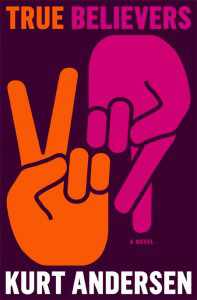
Published by Random House on July 10, 2012
True Believers purports to be the memoir of Karen Hollander, bestselling author, law school dean, and former candidate for the Supreme Court who, as a child, obsessed about James Bond. Hollander tells us all about the playful spy missions she and her friends undertook while building up to the terrible secret from 1968 that she means us to accept as true. Hollander finally describes this troubling event about two-thirds of the way through the book, but I stopped caring long before the revelation arrived.
During the first half of the novel, Hollander is a preteen or young teen living largely within her own imagination. Her secret crushes and James Bond fantasies make for less than compelling reading. A 14-year-old white kid’s observations of the civil rights movement from her bedroom community in Chicago’s North Shore district are equally uninspiring, as are her predictable reactions to the world events (including the Kennedy assassination) she sees on television. Shortly before the novel’s midway point, Hollander turns 17 and morphs into a female Holden Caulfield, condemning the phoniness of the world around her. Unlike Holden, however, Hollander is driven by her growing political awareness. Where Holden searched for truth by visiting a prostitute, Hollander joins the SDS. You can probably surmise where the story goes from there.
Although the reader is asked to accept that True Believers is a memoir, it isn’t written like a memoir. It is more the story of a person struggling to write a memoir rather than the finished product. It certainly isn’t the kind of memoir a person like Hollander would actually publish. Kurt Andersen’s failure to sell the premise, his failure to make the novel read like an actual memoir, is the novel’s biggest failing.
Apart from its credibility issues, much of True Believers is dull for the same reason that many actual memoirs are dull: reading about someone who is obsessed with the triviality of her own life is a tedious experience. The attempt to jimmy a love story into the plot adds nothing of interest. I would call the last quarter of the novel anti-climactic but for the absence of any real climax.
Hollander has a tendency to over-intellectualize life. She equates Disneyland and pornography and megachurches, all of which prove Americans are “adorable and ridiculous” in their desperation “to immerse in fantasy.” She strives to wax eloquent about the need to embrace “the flotsam and jetsam of life.” All of it strikes a false note. Her contrasts between life in the 1960s and contemporary America struck me as artificial.
Andersen makes some worthy observations about the hysterical nature of modern news coverage and the nuttiness/hypocrisy of popular political dogma, but those notions are far from original. To the extent that the novel tries to say something profound about snitching, it fails. In fact, I was never quite sure what Andersen was trying to say.
True Believers might have worked as a short story, without the trappings of a memoir. The bones of a reasonably good tale are buried within the novel. Sadly, it takes too much effort to uncover those bones. They are better left interred.
NOT RECOMMENDED